Key takeaways:
- Multi-generational health patterns reveal familial connections to conditions like heart disease and mental health issues, highlighting the importance of awareness for personal health management.
- Genealogy not only helps identify health risks but also uncovers emotional legacies, allowing individuals to confront challenges and make proactive health choices.
- Engaging in conversations with relatives about health histories can provide valuable insights, revealing patterns and guiding better health practices for future generations.
- Documenting family health findings, enriched with personal anecdotes and technology, creates a comprehensive narrative that preserves legacies and informs future health decisions.
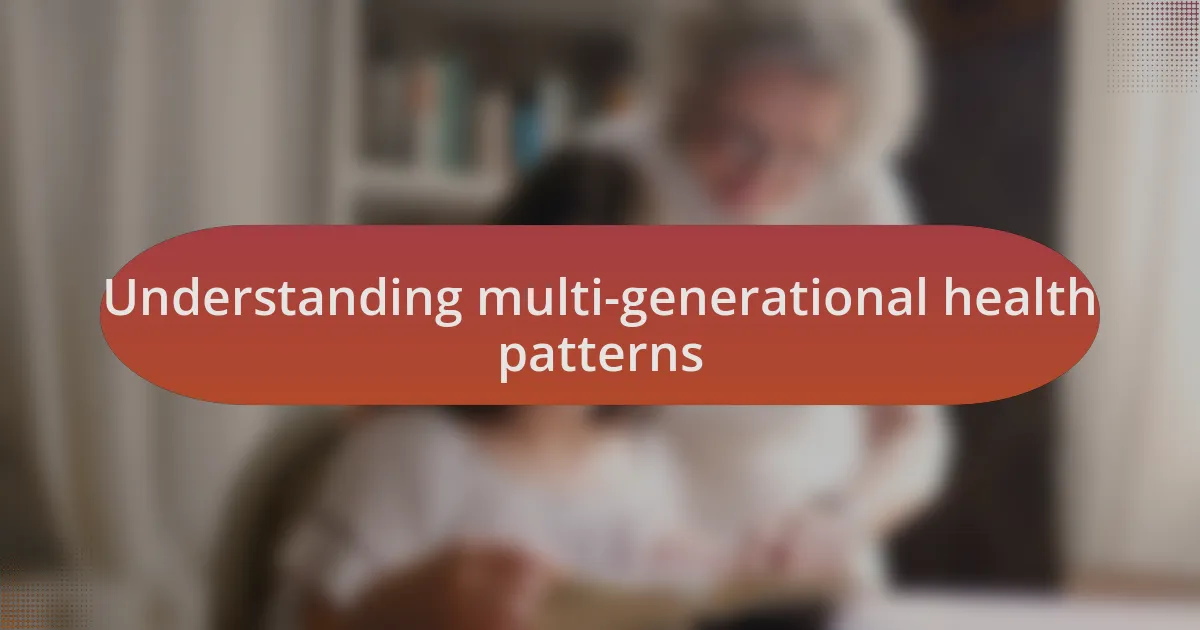
Understanding multi-generational health patterns
As I delved into my family’s history, I was astounded by the patterns of health that stretched through generations. It’s fascinating to see how conditions like heart disease and diabetes reappeared like echoes from the past. Have you ever thought about whether your health issues might be part of a larger family story?
Exploring these patterns has not only informed my understanding of my own health but has also deepened my connection to my ancestors. I remember chatting with my grandmother about her siblings and their shared struggles with depression. This opened my eyes to the fact that mental health, just like physical conditions, can run in families, prompting me to pay closer attention to my well-being.
Looking into my family’s health history made me realize that we’re not alone in our battles; we’re part of a lineage facing similar challenges. By understanding multi-generational health patterns, we can empower ourselves to make proactive choices. Have you checked your family tree for health clues? It could be the key to taking charge of your future health.
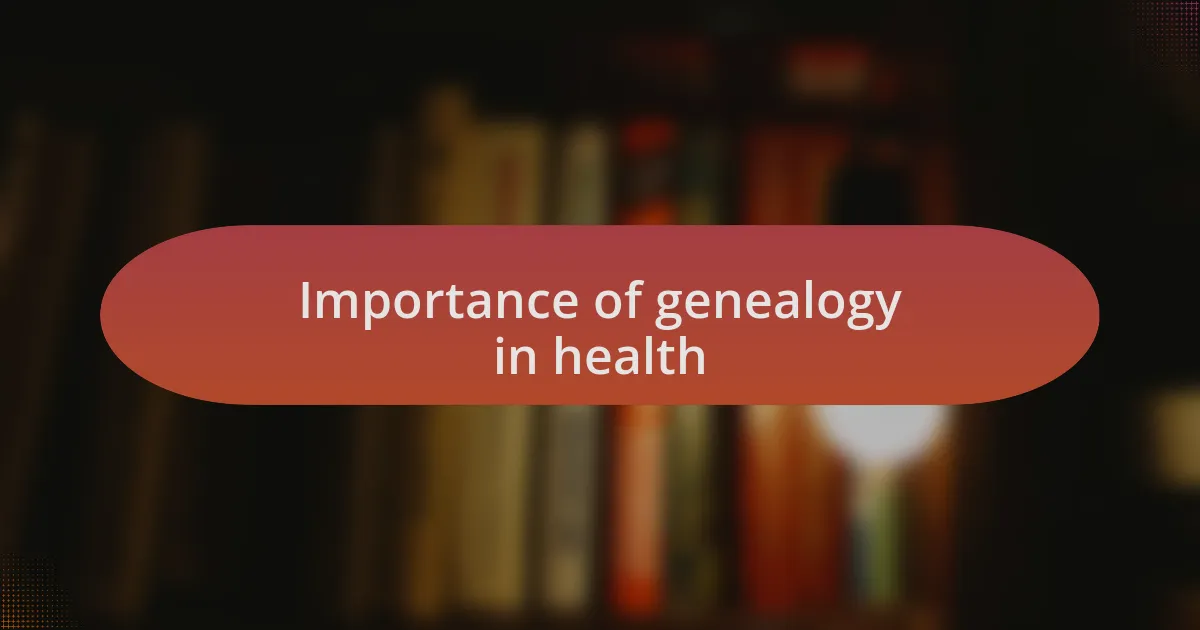
Importance of genealogy in health
Understanding the importance of genealogy in health is like holding a mirror to our shared past. When I uncovered that both my grandfather and father faced similar heart issues, it inevitably shifted my own health focus. You might wonder, how can knowing your ancestry impact your personal choices? Recognizing these links helps us make informed decisions about exercise and diet, tailored to the patterns we’ve inherited.
Moreover, I’ve discovered that diseases often have emotional roots that traverse generations. I once spoke to a cousin about our family’s history with anxiety, which led me to reflect on my own mental health. How much of what we face today is influenced by what our ancestors endured? By understanding these emotional legacies, we not only confront our personal challenges but also honor those who came before us.
Digging into genealogical health narratives allows us to break cycles. For instance, realizing that my great-grandmother grappled with diabetes illuminated my need to adopt healthier habits right away. It truly highlights the power of family knowledge—are we destined to relive these experiences, or can we choose a different path? Ultimately, our ancestors’ stories can guide us toward better health, transforming inherited struggles into proactive wellness strategies.
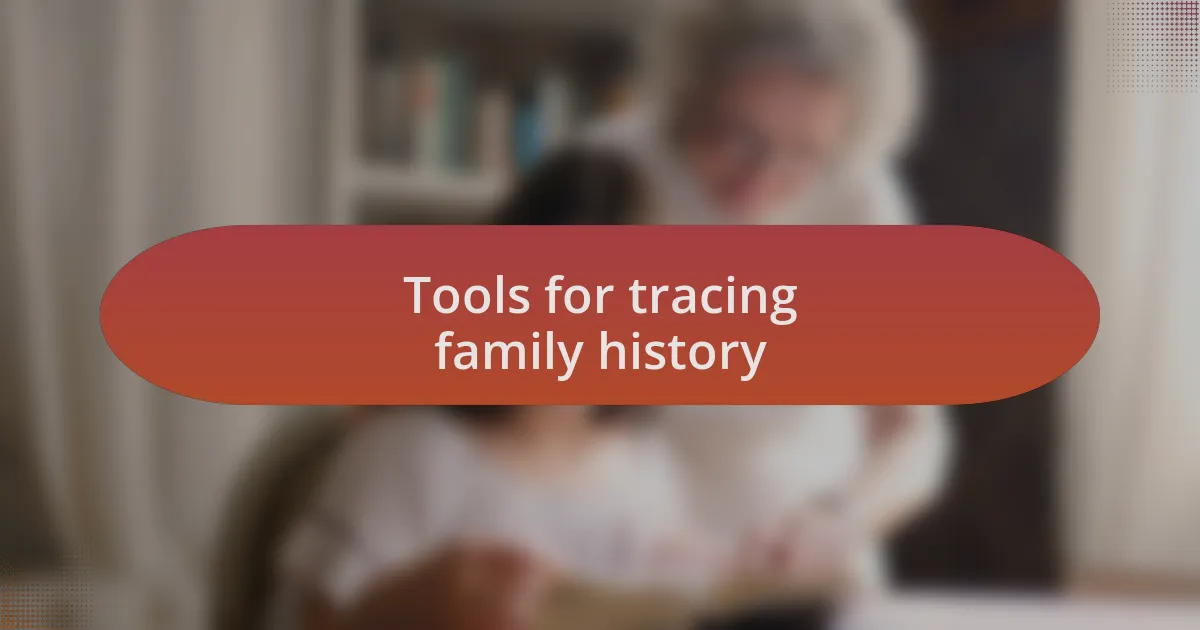
Tools for tracing family history
Exploring family history reveals a treasure trove of tools at your disposal for tracing your roots. I often turn to online databases like Ancestry.com or MyHeritage, where I’ve been able to link my family tree to historical records I never imagined existed. Have you ever stumbled upon a birth certificate or marriage license that instantly brought a new ancestor to life? These documents are pivotal; they not only unveil names and dates but also start to paint the colorful backdrop of our lineage.
Another invaluable resource lies within DNA testing services, such as 23andMe or AncestryDNA. When I received my results, it was as if I had unlocked a hidden chamber of my ancestry. The thrill of discovering unexpected heritage sparked countless conversations with relatives about shared traits and long-lost relatives. Isn’t it fascinating how a simple test can connect us to people we didn’t even know we were related to?
Lastly, don’t underestimate the power of local archives and libraries. I recall digging through dusty ledgers at my town’s historical society, uncovering stories about my ancestors that weren’t recorded anywhere else. Each grainy photo and handwritten note seemed to whisper secrets about their lives, reminding me that history is not just about names but the rich tapestry of experiences. What might you uncover if you spend an afternoon lost in the pages of history?

Gathering health information from relatives
I’ve found that one of the best ways to gather health information is through candid conversations with my relatives. It can be surprising how family gatherings often become an informal health history session. I once asked my grandmother about her siblings, and what followed was an eye-opening discussion about various health issues that had affected our family over generations. Has anyone else experienced unexpected revelations during these chats?
While chatting is essential, documenting this information is equally crucial. I remember creating a simple family health chart after one of these conversations, listing conditions that had appeared in different family members. The process not only organized the data but also highlighted patterns I hadn’t noticed before. Have you ever considered how a straightforward chart could transform your family health narrative?
Don’t hesitate to dig a little deeper by reaching out to distant relatives as well. I had a fascinating exchange with a cousin I had never met, who shared insights about our family’s health that were eye-opening. It’s amazing how a few probing questions can uncover valuable links to hereditary conditions, providing context for our own health journeys. How often do we overlook the rich stories that lie within our broader family network?
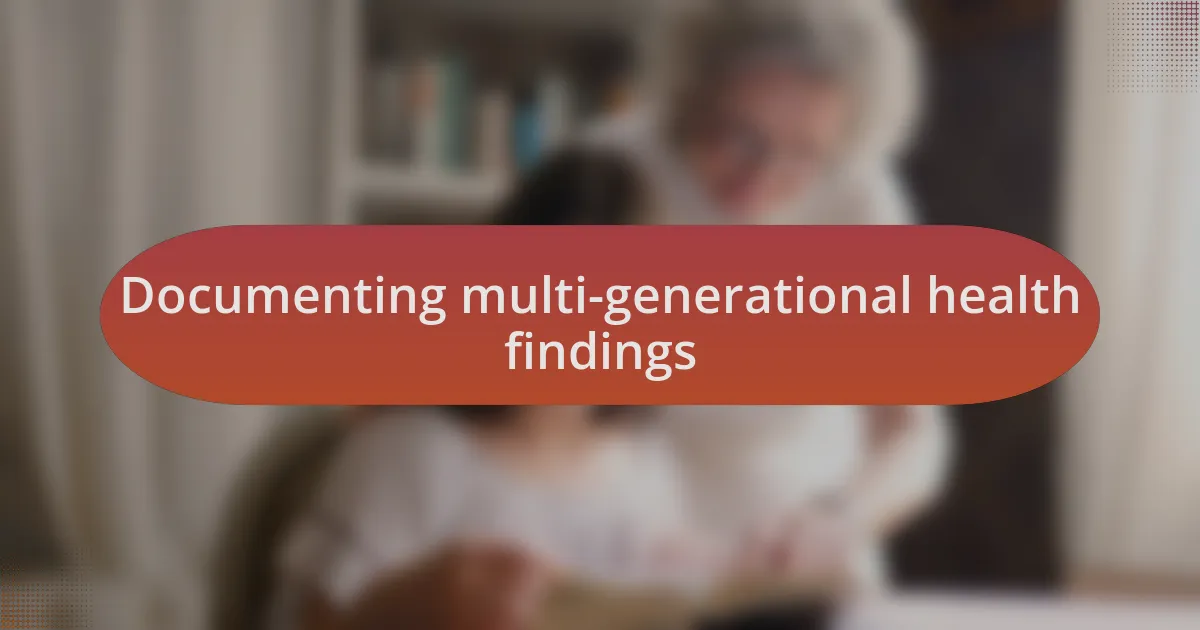
Documenting multi-generational health findings
Documenting health findings requires more than just writing things down; it involves creating a narrative that connects generations. I vividly recall how I meticulously transcribed my mother’s recollections of her parents’ health struggles. As I wrote, I felt a sense of responsibility to preserve these stories. Reflecting on her experiences made me realize how deeply interconnected our lives are. Have you ever felt that documenting could be a bridge to understanding your family’s journey?
Using technology can enhance this process significantly. I decided to use an app designed for genealogy to organize health data. The moment I added my late uncle’s heart condition, I could visually see the pattern that emerged, linking several family members. It was like piecing together a puzzle where each piece told a part of our story. Isn’t it incredible how technology can empower our understanding of health across generations?
To further enrich this documentation, I encourage incorporating photos and anecdotes alongside health records. When I came across a picture of my great-aunt, who battled diabetes, I felt an emotional connection as I learned more about her life. Sharing these details makes the findings more relatable and memorable, creating a lasting legacy for future generations. How will you ensure that your family’s health story is not forgotten?
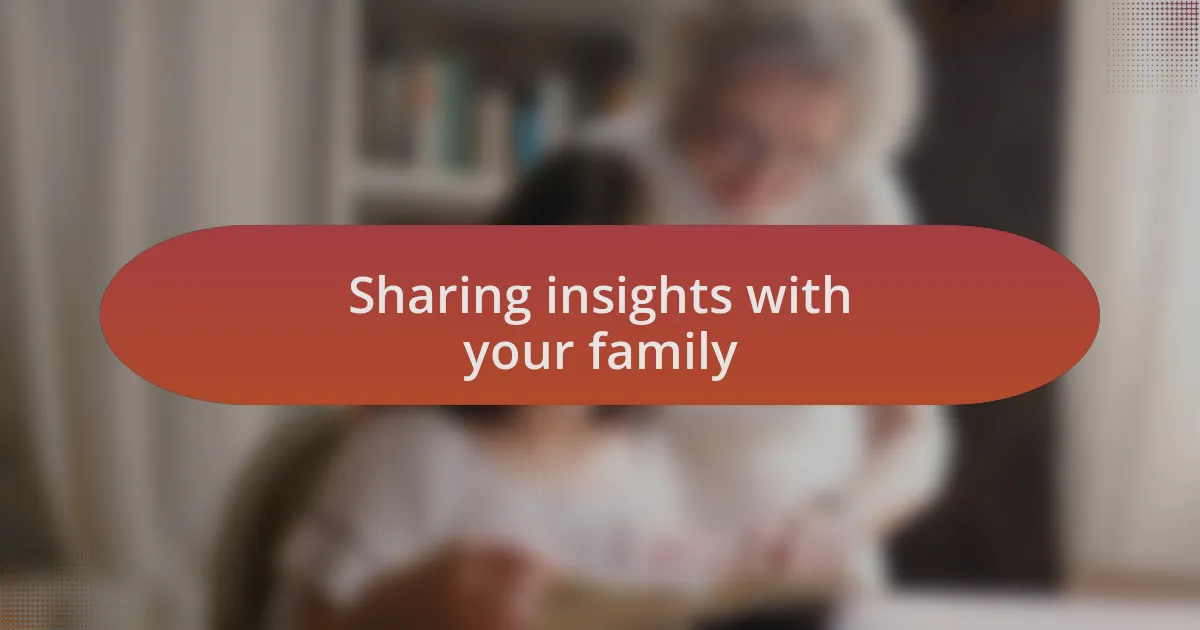
Sharing insights with your family
Sharing insights with your family opens a meaningful dialogue about health that can influence future generations. I remember sitting around the dinner table with my siblings, recounting the health challenges faced by our grandparents. Those conversations didn’t just bring us closer; they instilled a sense of collective responsibility for our health. Have you ever thought about how sharing these stories could inspire others in your family to prioritize their well-being?
In my experience, engaging family members in these discussions can reveal surprising insights. I once learned from my cousin, while flipping through old family albums, about our grandfather’s struggle with high blood pressure. It sparked a candid conversation about our own dietary habits and routines. Connecting these dots makes the past relevant and empowers us to make informed choices today, don’t you think?
I find that sharing health histories not only educates but also strengthens familial bonds. When I shared the challenges my aunt faced with mental health, I was stunned to find that several of my relatives had similar experiences but kept silent. This openness led to a profound conversation about wellness and support, something that can uplift everyone involved. Have you had moments where sharing your family’s health story has changed your perspective?